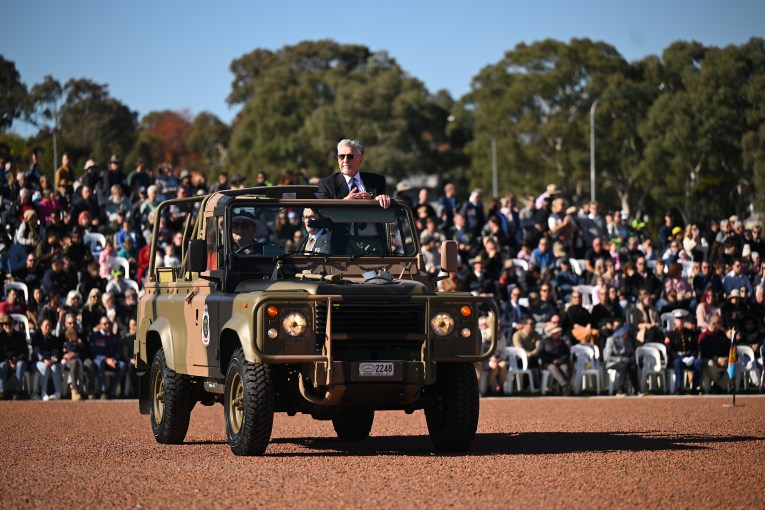The Killing Season: Gillard’s trigger questioned


When Kevin Rudd stormed to power in 2007, he seemed unassailable. At that time, no one would have predicted he would be ousted before the end of his first term in a coup led by his deputy, Julia Gillard.
Mr Rudd’s political fortunes began to deteriorate after an article appeared in a Sydney newspaper claiming his chief of staff Alister Jordan had been calling members of the caucus to determine the level of support for the prime minister.
These previously unheard interviews, conducted for The Killing Season ABC documentary, suggest that story may not have been exactly what it seemed.
Leadership challenges require a trigger: sometimes they’re spontaneous, sometimes they’re planned.
The Sydney Morning Herald story has been widely regarded as the ‘trigger’ for the 2010 challenge against Kevin Rudd – though to describe it that way is part of a black-and-white approach to explaining the complicated events that followed.
The idea that the Herald piece was a legitimate reason for a challenge was met with blunt scepticism by some, including Anthony Albanese.
• Voters should mark July 2 in their diaries
• Secret report may reveal how 9/11 really happened
• Exposed: online casinos operating illegally inside Australia
“You don’t make a decision to challenge for the leadership of the Labor Party against a first-term sitting Prime Minister because an article suggests that the chief of staff is supporting his boss to remain as Prime Minister.”
Julia Gillard said she asked for a meeting with party elder John Faulkner.
JG: I’m not someone who dissolves into tears very often, [but I] surprised myself by ending up crying as John Faulkner sort of comforted me.
SF: How were you feeling?
JG: I was feeling incredibly betrayed. I mean I could’ve at any point immersed myself right in the middle of destabilising Kevin. I could’ve said yes to all these people when they came pounding into my office to talk about leadership: let’s have a long conversation about leadership and let’s leak it to the media. Could’ve done that at any time. I did the complete reverse of that to keep supporting Kevin, and you know despite all of that, these huge efforts to support him, I was being viewed with suspicion.
Former Gillard advisor Gerry Kitchener didn’t make much of it.
GK: I didn’t disagree with her. [It] wasn’t a personal attack on me so it was easier for me to be ambivalent about it, but I thought that it was probably not all that surprising if it was true that the PM’s chief of staff was speaking to people.
SF: Who leaked it do you think?
GK: I don’t know who leaked it, obviously, but I’d be surprised if it was Rudd’s office who leaked it.
SF: What about your office?
GK: I don’t know whether anyone in our office would’ve leaked it. I would’ve thought that if someone who was supportive of Julia leaked it, it would be someone in the New South Wales Right.
…
There was no sign that Rudd perceived the danger he was in.
The Herald story said that Jordan had sounded out ‘the bulk of cabinet ministers and some members of the outer ministry’. It also claimed he’d spoken to ‘up to’ thirty-six backbenchers. The chief of staff is the prime minister’s eyes and ears in the Caucus. It is part of their job to be in regular contact with MPs, to test the mood and find out if there are any problems likely to affect the Prime Minister’s support.
Swan’s deputy chief of staff, Jim Chalmers, didn’t think there was anything out of the ordinary about the claims.
“In the days leading up to the leadership challenge, the Prime Minister’s office was making inquiries around the building to make sure that people were, you know, okay and solid, or to hear what their views were, to give people the opportunity to voice any concerns. That was entirely understandable and not in any way surprising.”
But The Sydney Morning Herald article was suggesting more pointed conversations that went further than normal staff work.
We checked the claims reported in the story, for the series and for this book. We contacted Rudd’s Cabinet, members of the outer ministry and a large number of backbenchers. Only two out of seventy-two Caucus members we contacted described having a conversation with Jordan in the weeks before the challenge in which he might have been testing support for Rudd. Fifteen of the eighteen-member Cabinet said they had not been sounded out – three declined to answer: Penny Wong, Stephen Smith and Joe Ludwig.

Julia Gillard confirms Bill Shorten played a role in Rudd’s downfall. Photo: Getty
On the day of the challenge, John Faulkner was the person Gillard and Rudd sought out for advice. We asked Faulkner about the article.
“I can’t help you. He [Jordan] didn’t canvas me about such matters and I am completely unaware of anybody else being canvassed.”
I put our findings to Gillard, who had forgotten what the article claimed.
SF: There is nobody amongst your Cabinet colleagues who has a recollection as described in the article.
JG: Well I certainly wouldn’t have expected any of those calls to be made to Cabinet colleagues, by definition.
SF: Sorry, the article said that it was Cabinet colleagues as well.
JG: My assumption would be that someone ringing around would be focusing on the backbench. I can’t give you numbers of people contacted, obviously. You’ve done your own research. But it speaks to this question and climate of suspicion and that’s the important thing.
…
SF: But it matters whether or not it was true doesn’t it?
JG: Let me just, I just want to order my thoughts about this. It wasn’t the only thing. The very fact that someone was feeding to The Sydney Morning Herald issues about my loyalty, that had to be concerning, and that wouldn’t be written about unless someone had raised it with them.
That morning, Gillard stayed in her office and had a round of discussions with factional operatives and confidants. I asked her a number of times about the key players that day. She required prompting on the role of Bill Shorten.
SF: How important was Bill Shorten’s role?
JG: Look I think Bill played a role. He didn’t play the role. The person who played the role was me. A number of people played a role and Bill was one of them. I think Mark Arbib and a number of others probably played a bigger role.
It suits the contemporary Labor narrative to say the challenge was driven by Mark Arbib. Unlike Shorten, Arbib is out of politics.
This is an edited extract from Sarah Ferguson’s The Killing Season Uncut (MUP), published Monday April 18. It is available at all good bookstores and at mup.com.au.










